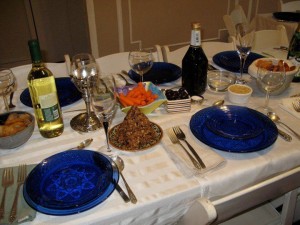A few years ago, while I was in the middle of preparing for Passover, I sat down and wrote this. I wanted to find a way to convey to my children why Passover, and the enormous amount of preparation for it, was so important to me, why it mattered, and how although I spent so much time on the food and preparing the house, it wasn’t really about that. This poem was included in The Torah: A Women’s Commentary and has been used at many congregational and women’s seders since then. Shortly after that it was translated into Hebrew by Dr. Tzvia Walden, and I hear that it used in quite a few seders in Israel now too. That’s been a surprise but is a pretty cool thing.
Since it was written, it’s already become a moment frozen in time as Passover in our house has continued to evolve and change. Nothing stays the same, and nothing is ever done exactly the same way again. Little changes happen every year until you step back and realize just how much it has all shifted. Grief and illness, marriages and births, college acceptances and new jobs all impact on the guest list, the menu, the conversation. That too is part of our ongoing story.
The seder is a love song written
in the language of silver polish
and dishpan hands
freshly grated lemon zest
blanched almonds
ground pecans
shelled pistachios
pitted olives
sliced meat
matzah meal
white tablecloths
to-do lists
trips to Boro Park and Sahadi’s
This is how it’s done.
ashkenazi haroset
vegetarian chopped liver
my mother’s real chopped liver
Bonnie’s matzah ball soup
Israeli salad
gefilte fish terrine
chesnut farfel stuffing
tzimmes
leek and shallot kugel
salmon in grape leaves with pine nuts
turkey and brisket
coconut macaroons
sephardic lemon pistachios cookies
pecan meringues
chocolate dipped apricots
Remember.
tables stretched the length of the house
tulips on the mantle
my grandmother’s blue glass plates
Aunt Hannah and Uncle Joe’s silver
Nana’s candlesticks
the silver salt bowls from my mother
Frieda and Solly’s cut-glass horseradish pot
the wedding present seder plate
grape juice stains on the tablecloth
thin paperback hagaddot
our mismatched family of friends
silly half-versions of songs
and don’t lick the wine from your finger after the plagues
Don’t be fooled by the easy domesticity of these words.
This is more than a recipe for nostalgia.
This is an urgent coded message of survival
adaptation
love.
Read between the words.
© 2007 by Hara E. Person. All rights reserved.
This poem originally appeared in The Torah: A Women’s Commentary (URJ Press, 2008).


This poem gave me chills.. you say so clearly why I love the passover my mother in law has presided over for 40 years. Thank you.